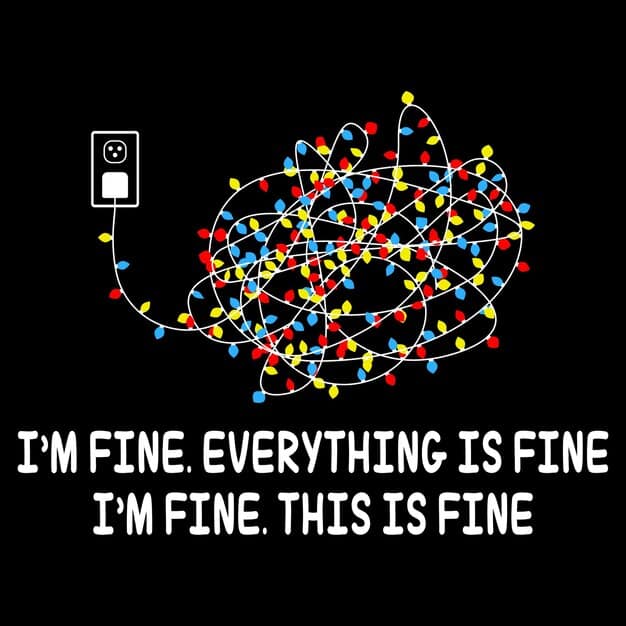Internet Drama: Impact on Mental Health & Coping Strategies

Internet drama, often fueled by anonymity and rapid communication, significantly impacts mental health, leading to stress, anxiety, and depression; effective coping strategies include limiting exposure, practicing mindfulness, and seeking support from trusted sources.
The digital age has brought us unprecedented connectivity, but it has also ushered in a new era of interpersonal conflict: the impact of internet drama on mental health: coping strategies for staying sane online. This constant exposure to negativity and conflict can take a serious toll on our well-being.
Understanding the Nature of Internet Drama
Internet drama, a ubiquitous phenomenon, manifests in various forms across digital platforms. From heated debates on social media to orchestrated attacks on individuals, understanding the nature of this drama is crucial for mitigating its impact.
Common Forms of Online Drama
Online drama can take many forms, each with its own set of characteristics and potential for harm. Recognizing these different forms is the first step in understanding how to navigate and cope with them effectively.
- Flaming: Hostile and insulting interactions between individuals, often involving personal attacks and aggressive language.
- Cyberbullying: Repeated and intentional harassment or intimidation of an individual using electronic means.
- Trolling: Deliberately provoking or upsetting others online for personal amusement or to disrupt discussions.
- Cancel Culture: Public shaming and ostracizing of an individual for perceived offensive or inappropriate behavior.
These forms of online drama can quickly escalate and have serious consequences for the mental health of those involved.
The Psychology Behind Online Conflict
Several psychological factors contribute to the prevalence and intensity of online conflict, including disinhibition, anonymity, and the lack of nonverbal cues. Understanding these factors can provide insight into why online interactions often devolve into drama.
- Anonymity: The ability to hide one’s identity online can lead to a sense of invincibility and encourage risky or aggressive behavior.
- Disinhibition: The lack of face-to-face interaction can lower inhibitions and make it easier to say things that one would not say in person.
- Deindividuation: A sense of anonymity and belonging to a group can lead individuals to lose their sense of personal responsibility.
- Lack of Nonverbal Cues: The absence of facial expressions, body language, and tone of voice can lead to misunderstandings and misinterpretations.
These psychological factors create an environment where conflict can easily escalate and have a significant impact on mental well-being.
In conclusion, recognizing the various forms of online drama and understanding the psychological factors that fuel it are essential steps in developing effective coping strategies. By being aware of these dynamics, individuals can better protect their mental health and navigate the online world in a healthier way.

Mental Health Impacts of Internet Drama
The persistent exposure to internet drama can have significant and far-reaching effects on mental health. From increased stress levels to the development of more serious mental health conditions, understanding these impacts is crucial for developing effective coping strategies.
Increased Stress and Anxiety
One of the most common mental health impacts of internet drama is increased stress and anxiety. The constant exposure to conflict and negativity can trigger the body’s stress response, leading to a range of physical and psychological symptoms.
This chronic stress can impair cognitive function, disrupt sleep patterns, and weaken the immune system, making individuals more vulnerable to both physical and mental illnesses.
Depression and Low Self-Esteem
The experience of being targeted in online drama can be particularly damaging to self-esteem and mental health. Cyberbullying, harassment, and public shaming can lead to feelings of worthlessness, hopelessness, and isolation.
These feelings can contribute to the development of depression, a serious mental health condition that can have a significant impact on daily life. Individuals may experience persistent sadness, loss of interest in activities, and difficulty concentrating.
Sleep Disturbances and Irritability
The emotional toll of internet drama can also disrupt sleep patterns and increase irritability. The stress and anxiety associated with online conflict can make it difficult to fall asleep or stay asleep, leading to fatigue and exhaustion.
This lack of sleep can further exacerbate mental health issues, making individuals more vulnerable to stress, anxiety, and depression. Irritability and mood swings are also common consequences of sleep deprivation.
In summary, the mental health impacts of internet drama are significant and can have far-reaching consequences. Recognizing these impacts and seeking appropriate support is essential for protecting one’s well-being in the digital age.
Coping Strategies: Limiting Exposure
One of the most effective coping strategies for dealing with internet drama is to proactively limit exposure to it. This involves making conscious choices about the content you consume and the platforms you engage with.
Setting Boundaries
Setting boundaries in the online world is essential for protecting your mental health. This involves making conscious decisions about the types of content you consume, the platforms you engage with, and the people you interact with. Clear boundaries can help you control your exposure to negativity and conflict.
- Unfollowing or Muting Accounts: Remove accounts that consistently post negative or inflammatory content from your feed.
- Blocking Users: Take action against individuals who engage in harassment or cyberbullying by blocking them from contacting you.
- Limiting Time on Social Media: Set daily or weekly limits on your social media usage to reduce your exposure to online drama.
These steps empower you to curate a more positive and supportive online environment.
Curating Your Online Environment
Curating your online environment involves actively shaping the content you see and the interactions you have. By carefully selecting the sources you follow and the communities you join, you can create a more positive and supportive online experience.
This may involve seeking out positive and uplifting content, engaging in constructive discussions, and avoiding platforms or communities that are known for toxicity and conflict.
By taking control of your online environment, you can significantly reduce your exposure to internet drama and safeguard your mental health.
Ultimately, limiting exposure is a proactive and effective coping strategy for managing the negative impacts of internet drama. By setting boundaries and curating your online environment, you can create a more positive and supportive digital experience.

Practicing Mindfulness and Detachment
Mindfulness and detachment are powerful coping strategies that can help you navigate internet drama without getting emotionally entangled. These practices involve cultivating awareness of your thoughts and emotions and developing a sense of distance from the drama itself.
Mindfulness Techniques
Mindfulness techniques can help you stay grounded in the present moment and observe your thoughts and feelings without judgment. This can be particularly helpful when dealing with online drama, as it allows you to respond with intention rather than react impulsively.
- Deep Breathing Exercises: Practice deep, slow breathing to calm your nervous system and reduce feelings of anxiety.
- Body Scan Meditations: Focus your attention on different parts of your body to increase awareness and reduce tension.
- Mindful Scrolling: Pay attention to your thoughts and feelings while scrolling through social media, and take breaks when you feel overwhelmed.
These simple techniques can help you stay centered and reduce the emotional impact of online drama.
Developing Emotional Detachment
Developing emotional detachment involves cultivating a sense of distance from the drama itself. This does not mean being indifferent or uncaring, but rather learning to observe the situation without getting emotionally entangled. By detaching from the drama, you can reduce its impact on your mental health and respond in a more rational and balanced way.
This may involve reminding yourself that the opinions and actions of others are not a reflection of your worth, and focusing on your own values and priorities.
In conclusion, practicing mindfulness and developing emotional detachment are valuable coping strategies for navigating internet drama. By cultivating awareness and creating distance, you can protect your mental health and maintain a sense of perspective.
Seeking Support and Connection
Maintaining strong social connections and seeking support from trusted individuals are essential coping strategies for navigating internet drama. Sharing your experiences and feelings with others can provide valuable perspective, validation, and emotional support.
Building Strong Social Connections
Building strong social connections involves investing time and effort in nurturing relationships with friends, family, and other supportive individuals. These connections can provide a sense of belonging and reduce feelings of isolation, which can be particularly helpful when dealing with online drama.
This may involve engaging in activities together, offering emotional support, and actively listening to one another. Strong social connections can serve as a buffer against the negative impacts of internet drama.
Reaching Out for Help
Reaching out for help involves seeking support from trusted individuals or professional resources when you are struggling to cope with online drama. This may involve talking to a friend or family member, joining a support group, or consulting with a therapist or counselor.
Seeking help is a sign of strength, not weakness, and can provide you with the tools and resources you need to navigate challenging situations. Professional support can be particularly helpful if you are experiencing significant distress or mental health symptoms.
Ultimately, seeking support and connection is a crucial coping strategy for navigating internet drama. By building strong social connections and reaching out for help when needed, you can protect your mental health and foster resilience.
Promoting a Positive Online Culture
In addition to personal coping strategies, it is important to actively promote a positive online culture. This involves contributing to a more respectful, supportive, and inclusive environment for all users.
Practicing Empathy and Respect
Practicing empathy and respect involves putting yourself in others’ shoes and treating them with kindness and consideration, even when you disagree with their views. This can help to de-escalate conflicts and create a more positive online atmosphere.
This may involve actively listening to others’ perspectives, avoiding personal attacks, and using respectful language in your interactions. Empathy and respect are fundamental to building a healthy online culture.
Reporting Abuse and Harassment
Reporting abuse and harassment involves taking action against individuals who engage in harmful behavior online. This may involve reporting violations to platform administrators, blocking or muting abusive users, and supporting victims of cyberbullying.
Reporting abuse and harassment sends a message that such behavior is not acceptable and helps to create a safer and more inclusive online environment.
In conclusion, promoting a positive online culture is essential for mitigating the negative impacts of internet drama. By practicing empathy and respect and reporting abuse and harassment, we can contribute to a more supportive and inclusive digital world.
| Key Aspect | Brief Description |
|---|---|
| 🛡️ Setting Boundaries | Unfollow or block negative accounts to curate a positive online experience. |
| 🧘 Mindfulness | Use breathing exercises and meditation to stay grounded during online conflicts. |
| 🤝 Seeking Support | Connect with trusted individuals and seek professional help if needed. |
| 🌐 Positive Culture | Promote empathy and report abuse to improve online interactions. |
Frequently Asked Questions
▼
Internet drama encompasses various forms of online conflict, including flaming, cyberbullying, trolling, and cancel culture. These interactions often involve hostile exchanges and can have negative impacts on mental health.
▼
Exposure to internet drama can lead to increased stress, anxiety, depression, and low self-esteem. It can also disrupt sleep patterns and increase irritability, impacting overall well-being.
▼
Effective coping strategies include limiting exposure, practicing mindfulness, seeking support from trusted individuals, and promoting a positive online culture. Setting boundaries and curating your online environment are helpful steps.
▼
You can limit exposure by unfollowing or muting negative accounts, blocking users who engage in harassment, and setting time limits on social media usage. Curate your online environment for a more positive experience.
▼
Promoting a positive online culture helps create a more respectful, supportive, and inclusive environment for all users. Practicing empathy, reporting abuse, and advocating for positive interactions contribute to a healthier digital world.
Conclusion
Navigating the complexities of internet drama requires a multifaceted approach that combines personal coping strategies with proactive efforts to promote a positive online culture. By limiting exposure, practicing mindfulness, seeking support, and advocating for respectful interactions, individuals can mitigate the negative impacts of online conflict and foster a healthier digital environment.






